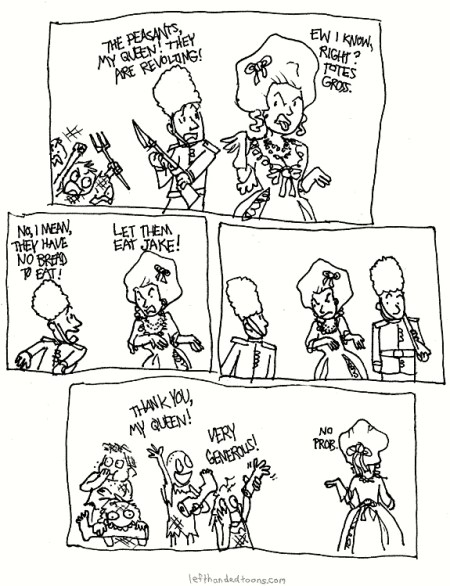On ADS-L on the 20th, Quote Investigator Garson O’Toole wrote:
This post was made in response to [Fred Shapiro’s] request for famous quotes from comic strips. This topic is complicated enough that I think a separate discussion thread will be helpful.
The double-meaning of the phrase “The peasants are revolting” was featured in the comic strip “The Wizard of Id”. Here is a [11/8/64] piece in “The Philadelphia Inquirer” that mentioned the joke within an introduction to the comic before its debut in syndication.
The ambiguity became closely associated with The Wizard of Id, as in the collection in #1, but of course it didn’t originate there. In Garson’s ADS-L posting, his focus was on antedating the joke — antedating is a preoccupation of the hounds of ADS-L — but my interest here is on other things: the comic strip itself and some entertaining examples of the joke, regardless of when they appeared.
From the Inquirer:
A magic potion of medieval merriment, a new comic strip entitled “The Wizard of Id,” will be offered to Inquirer readers six days weekly starting Monday.
The comic is straight from the Dark Ages — but its satirical, tongue-in-cheek views of royalty somehow never made the formal history books.
There is the King of Id — “a tyrant’s tyrant” — who, when told the peasants are revolting,” calmly replies, “You can say THAT again.”
Readers will get such lines daily in “The Wizard of Id,” the creation of the team of Brant Parker and Johnny Hart.
Overview from Wikipedia:
The Wizard of Id is a daily newspaper comic strip created by American cartoonists Brant Parker and Johnny Hart. Beginning in 1964, the strip follows the antics of a large cast of characters in a shabby medieval kingdom called “Id”. From time to time, the king refers to his subjects as “Idiots”. (The title is a play on The Wizard of Oz, combined with the Freudian psychological term Id, which represents the instinctive and primal part of the human psyche.)
In 1997, Brant Parker passed his duties on to his son, Jeff Parker, who had already been involved with creating Id for a decade. In 2002, the strip appeared in some 1,000 newspapers all over the world, syndicated by Creators Syndicate. Hart’s grandson Mason Mastroianni took over artist’s duties on the strip after Hart’s death in 2007. The new byline, “B.C. by Mastroianni and Hart,” appeared for the first time in another of their strips on January 3, 2010. On December 14, 2015, Jeff Parker also passed his duties on to Mastroianni.
On the joke in (#1): it turns on an ambiguity in the use of revolting, the PRP form of a verb REVOLT, which can either be (a) a V in the Progressive construction of English — in the VP complement to the main verb BE — or (b) an Adj.
In the (a) use, REVOLT-a (‘rise in rebellion’) is an intransitive V in the VP complement to BE; other verbs (with similar meanings) that can appear as intransitives here are REBEL, RIOT, and MUTINY.
In the (b) use, REVOLT-b (’cause to feel disgust’) is one of a large number of “psych verbs”, whose PRP forms are available as Adjs, both prenominal (a revolting smell) and predicate (the smell is revolting). The verbs in this class are both negative (like REVOLT) — DISGUST, APPALL, SICKEN — and positive — AMAZE, ASTONISH, SURPRISE.
So there are two different verb lexemes here, and both can occur as a one-word complement of BE. Rebellion verbs other than REVOLT-a don’t have psych counterparts, however, so the ambiguity arises just in this one case (and, in fact, psych verbs are mostly marginal as intransitive progressives).
Antedating. Barry Popik’s excellent website has an 10/12/14 entry on “The peasants/people are revolting”, taking it back to The Wizard of Id and some other mid-1960s versions and listing lots of later occurrences, including an especially memorable version in the Mel Brooks-directed comedy film History of the World, Part I (1981):
Count de Monet: It is said that the people are revolting.
King Louis XVI: You said it! They stink on ice!
You can watch the YouTube clip here.
Meanwhile, Garson O’Toole has found some earlier occurrences, and yesterday on ADS-L Jim Landau reported a find in the Irish Digest in 1959, for which he had only a snippet view. Garson noted that this was in fact a different joke based on the ambiguity, and unearthed this 7/5/55 cite in the Times Record of Troy NY:
A South American was describing his country to an American woman
“Our most popular sport is bullfighting,” he told her.
“Isn’t it revolting?” she asked.
“No,” smiled the man. “That’s the second most popular sport.”
Two more examples. From cartoonist Glenn Foden:
(this is Foden’s second appearance on this blog. His first was here.)
And then a grotesque version “My Queen” from left-handed toons by Drew Mokris in 10/6/11:
left-handed toons (for right handed people) is a group toon, founded in 2007 by Drew Mokris and Justin Boyd.



March 22, 2017 at 2:30 pm |
Robert Graves used to say that the original film script for the unfinished “I, Claudius” (1937) contained the line “My armies are revolting”. I heard him say it in a TV interview in the 60s or 70s:
I found this quote, but it’s unsourced.
March 22, 2017 at 3:34 pm |
Yet another, from Jeff Prucher on ADS-L:
The relevant panel:

March 26, 2017 at 12:27 pm |
Yet another, from Randy Alexander on ADS-L on the 23rd:
June 4, 2017 at 9:21 am |
[…] joke. Thanks to Barry Popik for his research on this topic. Also, thanks to Arnold Zwicky for his linguistic analysis and presentation of several […]